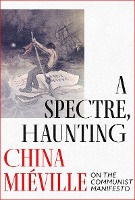China Miéville's brilliant reading of the modern world's most controversial and enduring political document: The Communist Manifesto.
'It's thrilling to accompany Miéville... as he wrestles - in critical good faith and incandescent commitment - with a manifesto that still calls on us to build a new world' Naomi Klein
'Read this and be dazzled by its contemporaneity' Mike Davis
'A rich, luminous reflection of and on a light that never quite goes out' Andreas Malm
'Reading with [Miéville] today sharpens our senses to contemporary internationalist movements from below' Ruth Wilson Gilmore
'[Written] with diligence and a ruthlessly critical eye worthy of Marx himself' Sarah Jaffe
In 1848, a strange political tract was published by two German émigrés. Marx and Engles's apocalyptic vision of an insatiable system, which penetrates every corner of the globe, reduces every relationship to that of profit, and bursts asunder the old forms of production and of politics, remains a picture of our world. And the vampiric energy of that system is once again highly contentious. The Manifesto shows no sign of fading into antiquarian obscurity, and remains a key touchstone for modern political debate.
China Miéville is not a writer hemmed in by conventions of disciplinary boundaries or genre, and this is a strikingly imaginative take on Marx and what his most haunting book has to say to us today. Like the Manifesto itself, this is a book haunted by ghosts, sorcery and creative destruction.

